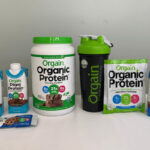In today’s fast-paced world, finding the best organic meal replacement has become essential for many individuals seeking to maintain a balanced diet while managing their busy lifestyles. Organic meal replacements offer a convenient solution, packed with nutrients, that can help you stay on track without compromising your health. In this comprehensive guide, we will explore the best organic meal replacements available in the market, their benefits, and how to choose the right one for your needs.
What is an Organic Meal Replacement?
An organic meal replacement is a nutritionally complete product designed to replace a traditional meal. These products are made from organic ingredients, ensuring they are free from synthetic additives, pesticides, and genetically modified organisms (GMOs). The best organic meal replacements typically contain a balance of macronutrients (proteins, carbohydrates, and fats), vitamins, and minerals.
Why Choose Organic?
The choice of organic meal replacements has significant advantages. Organic foods are cultivated without harmful chemicals and fertilizers, promoting environmental sustainability. By choosing organic, you are not only opting for healthier food options but also supporting farming practices that are better for the planet. Moreover, organic products are often fresher and more flavorful, which can enhance your overall eating experience.
Benefits of Organic Meal Replacements
- Convenience: Organic meal replacements provide an easy solution for busy individuals. They require minimal preparation and can be consumed on the go.
- Nutrient-Dense: The best organic meal replacements are designed to be nutritionally complete, providing a balanced mix of essential nutrients.
- Support for Weight Management: Many organic meal replacements can help you manage your weight by controlling calorie intake while still providing necessary nutrients.
- Improved Digestion: Organic meal replacements often include dietary fibers and probiotics, promoting gut health and better digestion.
- Allergy-Friendly Options: Many brands offer gluten-free, dairy-free, and vegan options, catering to various dietary needs and restrictions.
How to Choose the Best Organic Meal Replacement
When searching for the best organic meal replacement, consider the following factors:
1. Nutritional Content
Look for a meal replacement that provides a balance of macronutrients. A good organic meal replacement should have:
- Protein: Essential for muscle repair and growth. Look for sources like pea protein, brown rice protein, or hemp protein.
- Healthy Fats: Ingredients like flaxseeds, chia seeds, or coconut oil provide healthy fats that support brain function and energy levels.
- Carbohydrates: Choose options with complex carbohydrates, such as whole grains, to provide sustained energy.
2. Ingredients
Review the ingredient list to ensure it is primarily composed of whole, organic foods. Avoid products with artificial flavors, sweeteners, and preservatives. The best organic meal replacements will have a short, recognizable ingredient list.
3. Flavor and Texture
Taste is subjective, but it’s important to find a meal replacement that you enjoy. Many brands offer a variety of flavors, so try a few to find your favorite. The texture should also be appealing—smooth and easy to digest.
4. Brand Reputation
Research the brand’s reputation. Look for companies that prioritize transparency in sourcing and manufacturing. Reading customer reviews can also provide insights into the quality of the product.
5. Price
While organic meal replacements can be pricier than conventional options, it’s essential to find one that fits your budget. Consider the value of quality ingredients and nutritional content in relation to the cost.
Top 5 Best Organic Meal Replacements
Here are some of the best organic meal replacements currently available on the market:
1. Garden of Life Organic Meal Replacement
Garden of Life offers a range of organic meal replacement shakes that are not only nutritious but also delicious. Made with plant-based protein, this product contains essential vitamins and minerals. It’s gluten-free, non-GMO, and comes in various flavors.
2. Orgain Organic Protein Meal Replacement
Orgain’s meal replacement is a popular choice among health-conscious consumers. It features a blend of organic proteins, healthy fats, and a variety of nutrients. It’s also free from soy and gluten, making it suitable for various dietary needs.
3. Vega One All-in-One Shake
Vega One combines plant-based protein, greens, and probiotics to create a comprehensive meal replacement. With an emphasis on whole food ingredients, this shake provides a balanced source of nutrition. It’s an excellent choice for those seeking a vegan option.
4. Soylent Organic Meal Replacement
Soylent has gained popularity for its convenience and balanced nutrition. Their organic meal replacement offers a blend of protein, healthy fats, and carbohydrates. It’s designed for on-the-go consumption, making it perfect for busy lifestyles.
5. Kachava Superfood Meal Replacement
Kachava is known for its high-quality ingredients and extensive nutrient profile. This meal replacement combines plant-based proteins, superfoods, and healthy fats. It’s also free from gluten, soy, and dairy, catering to a wide range of dietary preferences.
The Role of Organic Meal Replacements in a Balanced Diet
Incorporating the best organic meal replacement into a balanced diet can enhance overall health and wellness. While these products are convenient, they should complement—not replace—whole foods in your diet. Aim to use meal replacements during particularly busy days or when you need a quick nutrient boost. Ideally, your diet should consist of a variety of whole foods, including fruits, vegetables, lean proteins, and healthy fats, to ensure you’re getting a wide array of nutrients. Using organic meal replacements strategically can help bridge nutritional gaps and maintain energy levels without sacrificing health.
Sustainable Practices in Organic Meal Replacement Production
The production of organic meal replacements often adheres to sustainable farming practices, making them an environmentally friendly choice. Organic farming methods reduce chemical runoff, improve soil health, and promote biodiversity. Many brands prioritize ethical sourcing, ensuring that the ingredients in their meal replacements are grown using practices that protect the environment. By choosing the best organic meal replacements, consumers can contribute to a more sustainable food system, supporting farmers who practice regenerative agriculture and promoting a healthier planet for future generations.
Customizing Your Organic Meal Replacement Experience
One of the great advantages of organic meal replacements is their versatility. Many brands allow you to customize your shakes by adding ingredients like fruits, vegetables, or nut butters. This not only enhances the flavor but also boosts the nutritional profile. For example, adding spinach or kale can increase your intake of vitamins and minerals, while a banana or berries can add natural sweetness and antioxidants. Experimenting with different combinations can help you find a blend that suits your taste preferences and dietary needs, making the experience of consuming meal replacements more enjoyable.
The Future of Organic Meal Replacements
As the demand for healthier, convenient food options continues to grow, the market for organic meal replacements is expected to expand. Innovations in ingredient sourcing and formulation are leading to new products that cater to specific dietary needs, such as keto, paleo, or plant-based diets. Additionally, advancements in nutritional science will likely contribute to the development of meal replacements that are even more nutritionally optimized. Consumers can expect to see a greater variety of flavors, textures, and formulations that not only provide convenience but also align with personal health goals and ethical values.
How to Incorporate Organic Meal Replacements into Your Diet
Incorporating the best organic meal replacement into your daily routine can be seamless. Here are some tips:
- Breakfast Boost: Start your day with a shake for a quick, nutritious breakfast.
- Post-Workout Recovery: Use a meal replacement as a recovery drink after exercising to replenish energy and support muscle recovery.
- Healthy Snack: If you’re busy and on the go, a meal replacement can serve as a healthy snack between meals.
- Meal Replacement for Busy Days: When you know you’ll have a hectic day, opt for a meal replacement to ensure you’re getting adequate nutrition without the hassle of cooking.
Common Myths About Organic Meal Replacements
Myth 1: Organic Meal Replacements are Just for Weight Loss
While many people use organic meal replacements for weight management, they can also be beneficial for anyone looking to improve their overall nutrition, regardless of weight goals.
Myth 2: All Meal Replacements are Created Equal
Not all meal replacements offer the same nutritional value. The best organic meal replacements prioritize high-quality ingredients and balanced nutrition.
Myth 3: Organic Meal Replacements are Expensive
While organic meal replacements can be pricier, they often provide better value in terms of nutrition and quality. Moreover, they can save time and money spent on buying and preparing traditional meals.
Conclusion
Finding the best organic meal replacement can significantly enhance your nutrition and simplify your eating habits. With a variety of options available, it’s crucial to consider your dietary needs and preferences when making a choice. By opting for organic meal replacements, you not only nourish your body but also support sustainable agricultural practices.
Incorporate organic meal replacements into your routine for convenience, nutritional balance, and a healthier lifestyle. Whether you are seeking a quick breakfast, a post-workout recovery option, or simply a healthy snack, the best organic meal replacements have got you covered. Explore the options available and find the one that fits seamlessly into your life!


